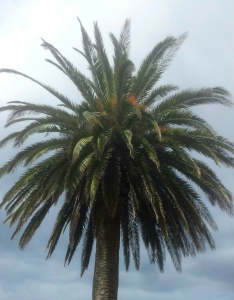Phoenix palms
This month’s pest plant is the phoenix palm. Now on the list of plants banned from sale or propagation, this is a very large palm with thick trunk and spiny leaves, creamy flowers and abundant date-like seeds. There are quite a few near the Sanctuary and birds like the fruit so we’re keen to stop their spread.
 If you have one nearby you’ll probably find new ones sprouting in your garden. This palm is hard to remove or kill so deal with them while they’re small or you’ll wind up with a giant home for rats and sparrows. You can dig out small specimens and poison larger ones – see the Weedbuster site for a fuller description and instructions. The spines are poisonous so be careful!
If you have one nearby you’ll probably find new ones sprouting in your garden. This palm is hard to remove or kill so deal with them while they’re small or you’ll wind up with a giant home for rats and sparrows. You can dig out small specimens and poison larger ones – see the Weedbuster site for a fuller description and instructions. The spines are poisonous so be careful!
